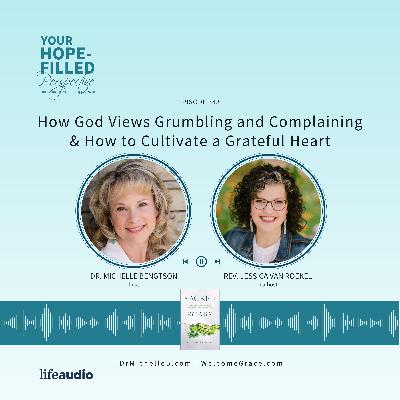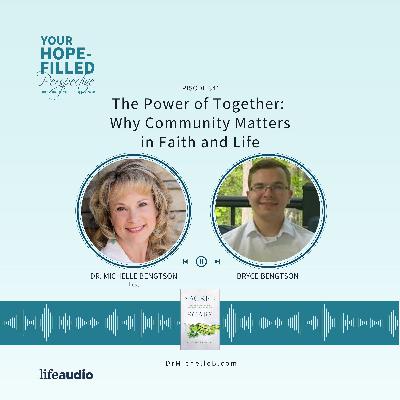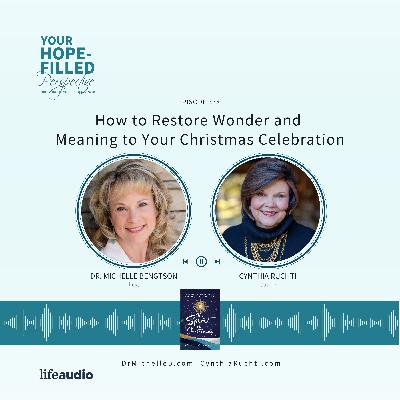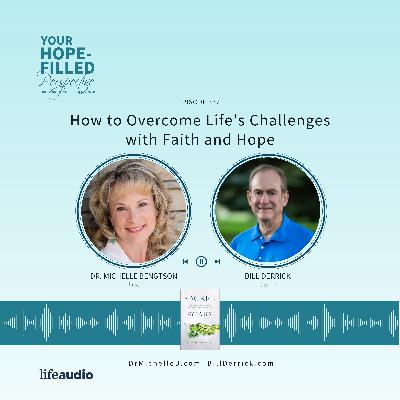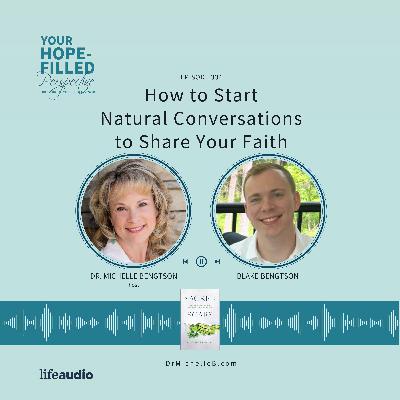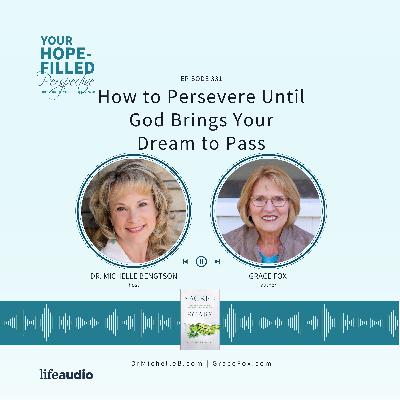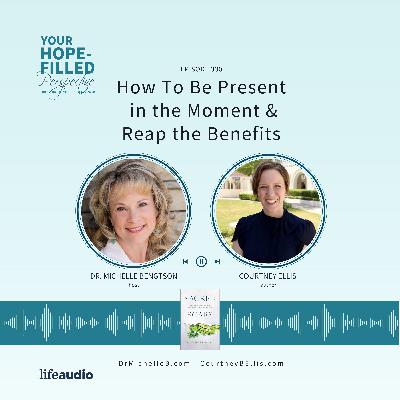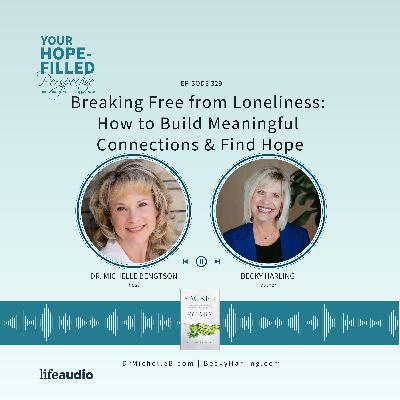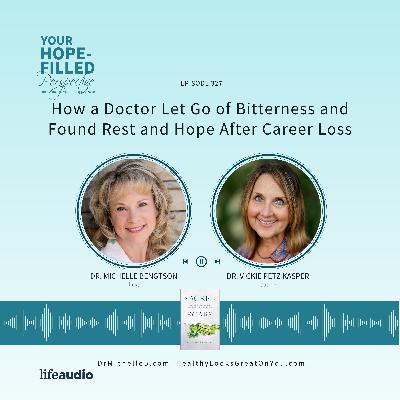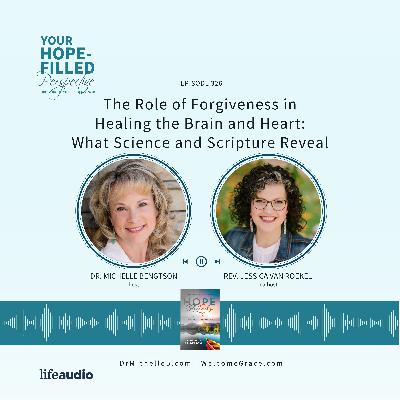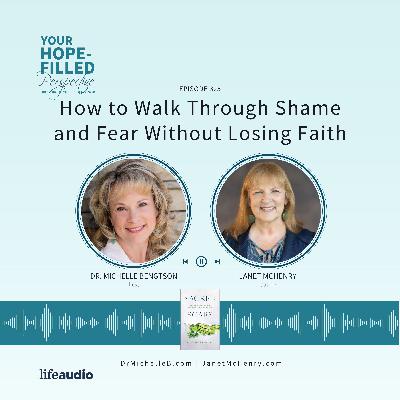Hope and Healing: How To Embrace God’s Presence in the Darkest Times
Description
Episode Summary:
Not one of us is exempt from loss. We lose what we expected, what we thought we believed, what we dreamed, our sense of security or identity. We lose friendships. We lose people we love.
What do we do with the disruption, the devastation of loss? How do we survive unpredictable grief, ongoing suffering, and the questions about God that happen in the dark nights of our lives? None of us want to be in seasons of sorrow. But sometimes the dark nights of life and faith have strange gifts. On the other side, we find ourselves free from the superficial in our lives. We discover peace and the assurance that we are loved. And we may experience a deeper, more honest relationship with the God we found in the dark.
In this episode, I sit down with pastor and author Aubrey Sampson to talk about navigating deep loss and learning to sense God’s presence in the darkest seasons.
Quotables from the episode:
- For me, writing was a prayer, writing was an anchor to God, writing was trying to figure out what in the world was happening when everything felt very out of control. And ultimately, writing did become a lifeline to hope in the midst of something that felt very hopeless.
- Grief is also very difficult to find language for, to explain, because it can feel like so many jumbled, opposed, and poignant metaphors or events all at once. Grief is like jumping on a cheerless trampoline, a constant disorientation between adrenaline and gravity. Grief is an empty, dilapidating playground, a sad, stoic icon of lost memories and what could have been. Grief is a firestone, full of uncontrollable destruction and rage and simultaneously a mudslide, sloppy, shocking and unstoppable. Grief is a planet, vast, cold, and mysterious, and grief is somehow also a roly-poly pill bug, often unnoticed by others, unarmored and earthy.
- The questions I was asking felt like almost like I described them in the book as like baby-deer questions. They just felt very vulnerable to me to be asking a God that I have centered my life around questions like, "Are you real? Is your arm too short to heal cancer? Where are you? Are my prayers hitting the ceiling fan or are they actually going to your ears, Lord?" I was asking some questions that I sort of felt like I should not be asking these, not because I felt ashamed. I know God can handle our hard questions. It wasn't that. It was just like, I should be beyond these questions by now. But the grief was so tender, Michelle, and so close.
- Some of my prayers were like, “how could you? Like, how dare you?” And part of it was her journey. She experienced healing from cancer about a year in and they didn't call it remission yet. But the doctors did say, this is great, cancer -free, the chemo's done what it should, and then about three months later, it came back with a vengeance. So that was some of it too. The whiplash of it made me ask God some really difficult questions. Like, “can you do anything good in this, God? Like, this feels so lacking in goodness, so lacking in hope, so lacking in beauty you are taking a mom away from three young sons you are taking a daughter away from parents a sister away from sister. Can your goodness reach even into this place?”
- There's just so many situations that prompt those honest gut level questions. Like, I know you God, but I don't understand. I don't understand and God often doesn't answer our why, but he does invite us to be honest with our questions. I mean, I think about so many in the Bible and some of the questions they ask, you know, it'd be easy to say, well, how could they dare? But we ask our own variety of those same questions. And I find it helpful to read those questions in scripture because, you know, you find some comfort in, "Okay, these were historical, ecumenical, faithful followers of God throughout history, and yet they are asking God the same questions. How long, O Lord? How lonely, I feel."
- Lamentations is full of these, like, "How could you? How dare you? How will you fix this?" And so to be able to know that actually, though it feels opposite of our faith. Actually, this type of posture before God is a very, I think, crucial part of our faith journey. I think God actually allows us and wants us to ask those questions on purpose as part of our spiritual formation. Again, we kind of get into our heads as if this isn't faithful or something's wrong. I'm going backwards spiritually, but then when you read those questions all throughout scripture, you can find some comfort in like, okay, these people are in the Bible, right? They were faithful followers of God. They're asking the same questions I'm asking. Yeah, God used them as examples for us. That's it. To teach us, to encourage us.
- One thing that you want as a Christian, even in your darkest hours, is for God to come for you with a sense of comfort. Holy Spirit provides you peace. Holy Spirit provides you a sense that God is with you. God sees you. God is around you. And what I found in my season of grief was that was not occurring. I could not sense God with me. I couldn't hear God speaking to me. I could not “connect with God.” I was just like, “God, where are you? Like, I can't even sense your spirit comforting me and I need you more than ever.” And I began because of the Lord's kindness, I was meeting with a spiritual director at the time. And I began to read about a very common spiritual experience again throughout history, again throughout the Bible, called the Dark Night of the Soul. Which, again, we tend to use it a little generically just to me, and I'm going through a hard time, that's a Dark Night of the Soul.
- A dark night of the soul was coined by St. John of the Cross right after the Spanish Inquisition. And what he talked about was the very thing I'm talking about, when you cannot sense God answering your prayers, when you cannot sense God's nearness, when you cannot see what God is doing, that sense of God's quote "absence" is actually what it means to walk through a dark night of the soul. That can happen in grief, it can happen in loss, it can happen just in life, midlife crisis, it can happen. And what we find in dark nights of the soul is something that We know to be true, God never leaves us nor forsakes us. But for some reason, God does tend to pull back that "felt sense of His presence." And part of what God is doing, we can't all understand everything God is doing, but part of what God is doing is teaching us that our faith is not just about a feeling.
- Our faith is about the object of our faith, Jesus. And so, whether we're "feeling" the presence of God or not, can we choose to have faith that says He is true, His character is true, He is steadfast, I will keep believing, I will keep leaning in, I will keep being faithful even when I can't "feel" Him. And there's something mysterious and explosive and actually good that we find in dark nights of the soul even though it's often quite painful and confusing.
- Michelle, it is hard to sort of find yourself on the grief map when you're in it, especially when it's fresh. And so sometimes you don't know is where I'm at normal, okay, should I be farther along than I am. And the hard part is, depending on the context texture from, often people want you to be further along than you actually are. And you're just not, I mean, it just until you've walked through grief, you, you don't know, no, no, no, I can't move faster than I can move. I am right where I am. And that's as far as I can go. I wrote about these, these three different moments in darkness to try to at least help readers, grievers, someone walking through any type of loss or transition to sort of go, "Okay, I might find myself here." And also, to say any of those places are right where you're supposed to be. God is not rushing you past the finish line of pain.
- Some of us, I think, like I said, rush past it or pretend it isn't happening, but just to go, "Okay, God, things are changing. This is a new season. I don't necessarily like it. I don't really enjoy why I'm here, but I'm going to trust you've got some discoveries for me. And so, I'm going to keep open to whatever you're doing as the night falls. And then the next phase, midnight, I mean, this is where I wrote about my best friend's jet death and just everything changing. I mean, it is just the onslaught of grief that you feel physically, you feel emotionally you experience spiritually it's in your body it's in your mind it's you know you know this from the mental health world your brain is flat you can't really function the way that you used to function and I wanted to put some language for that again just to say it is normal and your only job is to be gentle with yourself at your spiritual midnight your emotional midnight like just Be kind to yourself.
- Be kind to yourself. I think we want to learn the lesson and we want to build the muscles and we want to build resilience. We want to grow in our depth and our meaning. That will come, but it is okay to be right where you are for as long as you need to be, especially in that initial onslaught of grief. We write a lot about that in the section on midnight. And then the last section, when I was very careful not to do, Michelle, and I think you'll appreciate this as one who talks about her own depression. I didn't want to say, "But the sun is coming. Sunrise is on its way." I did not want to write another book about, like, quote, "sunny spirituality," because that's not always what healing is. Healing isn't always darkness to light. Sometimes healing is this gradual progression of, "Oh, I see a little glimmer of hope here." Okay, here's some light coming through.
- I think so often we celebrate like the mountaintop, or the victory and we forget to celebrate what a courageous thi


